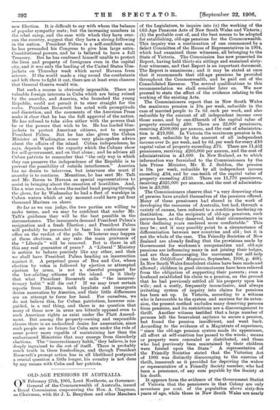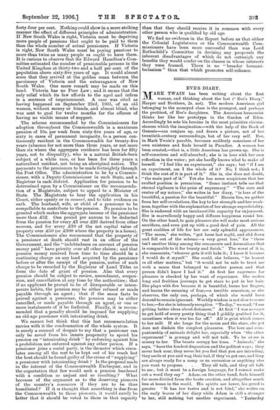OLD-AGE PENSIONS IN AUSTRALIA.
ON February 27th, 1905, Lord Northcote, as Governor- General of the Commonwealth of Australia, issued a Royal Commission empowering the Hon. A. Chapman, as.Chairman, with Sir J. L. Bonython and other Members of the Legislature, to inquire into (a) the working of the Old-Age Pensions Acts of New South Wales and Victoria ; (b) the probable cost of, and the best means to be adopted for establishing, old-age pensions for the Commonwealth. This inquiry was a continuation of one commenced by a Select Committee of the House of Representatives in 1904, which had examined three witnesses, all belonging to the State of Victoria. The Commission has now presented its Report, having held thirty-six sittings and examined sixty- four witnesses, and that Report is an important document. The Report is unanimous ; and it may be stated at once that it recommends that old-age pensions be provided throughout the Commonwealth, and be paid out of the Consolidated Revenue. The several qualifications to this recommendation we shall consider later on. We now proceed to state the effect of the evidence relating to the working of the existing Acts.
The Commissioners report that in New South Wales the maximum pension is 10s. per week, reducible in the case of married people to 7s. 6d. each per week, and also reducible by the amount of all independent income over those sums, and by one-fifteenth of the capital value of property exceeding £50. There are 22,000 pensioners, receiving £508,000 per annum, and the cost of administra- tion is £19,936. In Victoria the maximum pension is 8s. per week, reducible by the amount of all independent income over 2s. per week, and by 6d. per week for every £10 capital value of property exceeding £75. There are 11452 pensioners, receiving £205,000 per annum, and. the cost of administration is £1,699. In New Zealand, as to which information was furnished to the Commissioners by the late Prime Minister, Mr. R. J. Seddon, the pension is 10s. per week, reducible by all independent income exceeding £34, and by one-tenth of the capital value of property exceeding £150. There are 11,770 pensioners, receiving £325,000 per annum, and the cost of administra- tion is .23,936.
The Commissioners observe that "a very deserving class of persons have availed themselves of the pensions offered. Many of these pensioners had shared in the work of developing the resources of Australia, but had, through a variety of causes, been reduced to a condition bordering on destitution. As the recipients of old-age pensions, such persons have, as they deserved, had their circumstances in their declining years rendered more comfortable." This may be ; and it may possibly point to a circumstance of differentiation between new countries and old ; but it is not the whole of the case. The Friendly Societies of New Zealand are already finding that the provisions made by Government for workmen's compensation and old-age pensions are influencing many in not joining their lodges, and are thus discouraging the movement for self-help (see the Oddfellows' Magazine, September, 1906, p. 468). In New South Wales fraudulent claims have been made and allowed ; children in good circumstances have been relieved from the obligation of supporting their parents ; even a husband established his claim to a pension, on the ground that he had previously settled all his property upon his wife; and a costly, frequently inconclusive, and always irritating system of inquiry into claims for pensions has been set up. In Victoria, according to a witness who is favourable to the system and anxious for its exten- sion, the present method excludes many deserving persons from pensions, and its restrictions are a discouragement to thrift. Another witness testified that a large number of persons left the benevolent asylums to secure a pension, but found. the pension insufficient, and went back. According to the evidence of a Magistrate of experience, "since the old-age pension system made its appearance, all effort at self-exertion has passed to the winds ; means er property were concealed or distributed, and those who had previously been maintained by their children were foisted upon the State." A representative of the Friendly Societies stated that the Victorian Act of 1903 was distinctly discouraging to the exercise of thrift, inasmuch as it provided for depriving the widow or representative of a Friendly Society member, who had been a pensioner, of any sum payable by the Society at his death.
It appears from the evidence of the Government Statist of Victoria that the pensioners in that Colony are only seventeen per cent. of the population above sixty-five years of age, while those in New South Wales are nearly forty-four per cent. Nothing could show in a more striking manner the effect of different principles of administration. If New South Wales is right, Victoria must be depriving more people of pensions that ought to be paid to them than the whole number of actual pensioners. If Victoria is right, New South Wales must be paying pensions to more than twice as many people as ought to have them. It is curious to observe that Sir Edward Hamilton's Com- mittee estimated the number of pensionable persons in the -United Kingdom at thirty-two and a half per cent, of the population above sixty-five years of age. It would almost seem that they arrived at the golden moan between the parsimony of Victoria and the extravagance of New South Wales. One more remark may be made on this bead. Victoria has no Poor Law ; and it seems that the only relief which its law affords to the aged and infirm is a sentence of imprisonment. A case was cited as having happened on September 23rd, 1905, of an old woman, without money or friends, and almost blind, who was sent to gaol for twelve months for the offence of having no visible means of support.
The scheme recommended by the Commissioners for adoption throughout the Commonwealth is a maximum pension of 10s. per week from sixty-five years of age, or sixty in cases of permanent incapacity, to a person con- tinuously resident in the Commonwealth for twenty-five years (absence for not more than three years, or not more than six where the aggregate residence has been for fifty years, not to disqualify), who is a natural British-born subject of a white race, or has been for three years a naturalised resident, not being an aboriginal native. The payments to the pensioners to be made fortnightly through the Post Office. The administration to be by a Commis- sioner, with a Deputy-Commissioner in each State, and a Registrar in each district. Application for pension to be determined upon by a Commissioner on the recommenda- tion of a Magistrate, subject to appeal to a Minister of State. The Magistrate to hear the application in his Court, either openly or in camera, and to take evidence on oath. The husband, wife, or child of a pensioner to be compellable to contribute to the pension. No pension to be granted which makes the aggregate income of the pensioner more than £52. One pound per annum to be deducted from the pension for every £1 over £26 derived from other sources, and for every £10 of the net capital value of property over £50 (or £100 where the property is a home). The Commissioners also recommend that the property of a pensioner at death should vest in an officer of the Government, and the "indebtedness on account of pension money paid" have priority over all other claims ; and that pension money received from time to time should be a continuing charge on any land acquired by the pensioner before or after the receipt of the pension, notice of such charge to be recorded by the Registrar of Land Titles as from the date of grant of pension. Also that every pension should be subject to review, amendment, suspen- sion, and cancellation at any time by the authorities ; that if an applicant be proved to be of disreputable or intem- perate habits, the pension may be either refused or made payable through an agent ; that if the same facts be proved against a pensioner, the pension may be either cancelled, or made payable through an agent, or one or more instalments of it be forfeited. Finally, it is recom- mended that a penalty should be imposed for supplying an old-age pensioner with intoxicating drink.
We cannot but think that this last recommendation carries with it the condemnation of the whole system. It is surely a counsel of despair to say that a pensioner can only be saved from his innate propensity to spend his pension on "intoxicating drink" by enforcing against him a prohibition not enforced against any other person. If a pensioner joins a social party, is the decanter which circu- lates among all the rest to be kept out of his reach lest- the host should be found guilty of the crime of "supplying" a pensioner with intoxicating 'drink ? Is the proposal made in the interest of the Commonwealth Exchequer, and in the expectation that few would seek a pension burdened with a condition so unjust and so insulting ? What becomes of the argument as to the deserving pioneers of the country's resources if they are to be thus humiliated ? If it is thought that something is due from the •Commonwealth to those pioneers, it would surely be better that it should be voted to them in that capacity than that they should receive it in common with every other person who is qualified by old age.
We find no evidence in the Report before us that either the Colonial Legislatures or the Commonwealth Com- missioners have been more successful than was Lord Rothschild's Committee in devising any proposals the inherent disadvantages of which do not outweigh any benefits they would confer on the classes in whose interests they were framed. There is no "broader humani- tarianism " than that which promotes self-reliance.







































 Previous page
Previous page